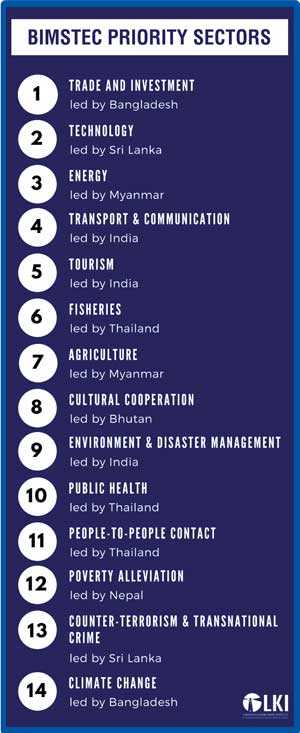Friday Feb 27, 2026
Friday Feb 27, 2026
Monday, 3 September 2018 00:00 - - {{hitsCtrl.values.hits}}

Sri Lanka will soon have a rare opportunity to contribute to the development of the Indian Ocean region, by harnessing the Bay of Bengal’s regional organisation. Sri Lanka is about to assume Chairmanship of that organisation – the Bay of Bengal Initiative for Multi-sectoral Technical and Economic Cooperation (BIMSTEC or the ‘Bay of Bengal Initiative’) – for two years.
Sri Lanka’s leadership of the Bay of Bengal Initiative comes at a pivotal moment. India needs a productive regional network to promote regional growth whilst sustaining domestic growth. Additionally, the other main regional organisation, the South Asian Association for Regional Cooperation (SAARC), has stalled. The Bay of Bengal Initiative therefore has an increasingly important role. The region’s littoral states account for 22% of the world’s population1 and have a combined GDP of around $ 3 trillion.2 Given the economic and strategic needs of these states, Sri Lanka must deploy effective leadership, to uplift its own position in the Bay region and the status of BIMSTEC as a regional mechanism.
A four-pronged approach
There are four areas in which Sri Lanka could demonstrate leadership – connectivity, security, trade, and institutional reform.
Connectivity
The Bay of Bengal Initiative envisions several different types of connectivity, including technology, people-to-people linkages, and transport.3 As the country designated to lead BIMSTEC’s work on technology, Sri Lanka has a particular interest in promoting technological connectivity in the region (see Figure 1). In 2008, leaders agreed to establish a Technology Transfer Facility (TTF) in Sri Lanka. The TTF aims to expand the technological knowledge and skills of micro, small and medium sized enterprises in the Bay of Bengal, and thereby build knowledge-based economies.4 Sri Lanka should study other regional technology transfer initiatives, like the ‘European Technology Transfer Offices Circle’ to ensure that the TTF is comparatively efficient and effective.5
Sri Lanka could also encourage BIMSTEC to introduce technology-driven ‘public goods’ like free internet connectivity. Sri Lanka has shown interest in similar initiatives by establishing public Wi-Fi spots6 and experimenting with Google’s Project Loon.7 Mobile network operators in BIMSTEC countries could also be encouraged to provide zero-rating services i.e. services that allows low-income citizens to access high-usage applications and websites like Facebook and WhatsApp without using data plans. This is a common practice in developing countries and could have positive economic spillover effects, by increasing business through social media.8
Security
As the Indian Ocean becomes increasingly important to regional powers like India and China, so does ensuring the security of the Bay of Bengal. In addition to urging members to ratify BIMSTEC’s security conventions,9 Sri Lanka could propose establishing coordinated maritime patrols to secure the Bay against non-traditional security threats like piracy and trafficking. This would expand the current practice of coordinated patrolling by India and Myanmar10 and follow the example of some ASEAN states.11 Sri Lanka could also work to establish a hotline among littoral states of the Bay, to facilitate this coordinated patrolling. In 2016, Indonesia, Malaysia and the Philippines agreed to establish a hotline to combat piracy and kidnappings, and to coordinate patrols in waters of common interest.12
Trade
BIMSTEC remains in the early stages of becoming a trading bloc. The value of BIMSTEC intra-regional trade in goods was $ 44 billion14 in 2017, which is an increase from $ 29 billion15 in 2007. However, this accounted for only 7% of member states’ total trade with the world.16 This partly reflects north-south trade patterns and limited trade complementarities. Meanwhile, ASEAN’s intra-regional trade in goods was $ 421 billion17 in 2017 and accounted for 26 of member states’ trade with the world. Sri Lanka should aim to boost intra-regional trade by finalising the BIMSTEC free trade agreement (FTA), which has been in discussion since 2004, and by setting intra-regional trade goals.

If there is no progress on the BIMSTEC FTA in the next two years, the agreement may become obsolete as BIMSTEC countries continue to pursue bilateral FTAs, including with non-BIMSTEC countries. Sri Lanka should also ensure that the FTA does not duplicate or contradict other existing or proposed bilateral and multilateral trade agreements of BIMSTEC members. It could also encourage member states to finalise and effect supplementary agreements to the BIMSTEC FTA, like the ‘Trade Facilitation Agreement’ and the ‘Agreement on Cooperation and Mutual Assistance in Customs Matters’, to advance BIMSTEC economic integration.19
Institutional reform
Sri Lanka has mooted the idea of a troika system comprising the current Chair, former Chair and future Chair of BIMSTEC to enhance its institutional stability and impact.20 This would be a valuable step to ensuring policy consistency, institutional memory, and strong leadership. Sri Lanka has also raised the idea of including provisions for Observers or Dialogue Partners.21 Such partners could potentially bridge resource gaps, through funding, knowledge sharing, and technical expertise.
In addition, Sri Lanka could work to enhance the professionalism of the Secretariat. The Permanent Secretariat of BIMSTEC was established in Dhaka in 2014, to act as a coordinating body and improve the negotiation and implementation of BIMSTEC policies. However, ensuring its effectiveness has proved challenging. The Secretariat appears to be understaffed and underfunded.22 Sri Lanka has an opportunity to improve this situation, and could look to relatively successful Secretariats like those of ASEAN and the Pacific Island Forum (PIF) as reference points. As a first step, the Secretariat could make its budget publicly available and begin producing annual reports detailing its funding allocations and activities. This would help member states to identify resource gaps and work towards meeting them.
Conclusion
The Bay of Bengal Initiative’s importance lies in connecting the relatively unintegrated South Asia to the well-integrated Southeast Asia, as well as in being a coordinating body for a key Bay in the larger Indian Ocean. Sri Lanka has diverse and untapped opportunities to transform BIMSTEC into a more impactful organisation. For Sri Lanka, the success of its upcoming chairmanship will also underscore its preparedness to lead the initiatives of larger regional organisations like the Indian Ocean Rim Association (IORA) and will demonstrate the leadership abilities of smaller states in the Indian Ocean region.
(Divya Hundlani is a Research Fellow at the Lakshman Kadirgamar Institute of International Relations and Strategic Studies (LKI). Anishka De Zylva was a Research Associate at LKI. The opinions expressed in this article are the authors’ own views. They are not the institutional views of LKI, and do not necessarily represent or reflect the position of any other institution or individual with which the authors are affiliated. This article was originally published on The Diplomat).
Notes
1 The World Bank. (2018). World Bank Open Data. Available at: https://data.worldbank.org/.
2 Ibid.
3 De Zylva, A. and Hundlani, D. (2018). BIMSTEC and Sri Lanka: A Potential Agenda for 2018-2020. The Lakshman Kadirgamar Institute. Available at: http://www.lki.lk/publication/bimstec-and-sri-lanka-a-potential-agenda-for-2018-2020/.
4 BIMSTEC. (2018). Technology. Available at: https://bimstec.org/?page_id=266.
5 The European Commission. (2018). The European Technology Transfer Offices Circle. Available at: https://ec.europa.eu/jrc/communities/community/629/about.
6 De Zylva, A. and Wignaraja, G. (2018). Is Sri Lanka Sitting on the Bench of Asia’s Booming Digital Economy?. The Lakshman Kadirgamar Institute. Available at: http://www.lki.lk/publication/is-sri-lanka-sitting-on-the-bench-of-asias-booming-digital-economy/.
7 Ibid.
8 Ibid.
9 BIMSTEC. (2018). Counter-Terrorism and Transnational Crime. Available at: https://bimstec.org/?page_id=288.
10 The Hindu. (2016). India-Myanmar Sign SOP on Joint Patrol. Available at: http://www.thehindu.com/news/cities/Visakhapatnam/indiamyanmar-sign-sop-on-joint-patrol/article8256109.ece.
11 Chan, F. and Soeriaatmadja, W. (2017). Indonesia, Malaysia, Philippines Launch Joint Operations in Sulu Sea to Tackle Terrorism, Transnational Crimes. The Straits Times. Available at: https://www.straitstimes.com/asia/indonesia-malaysia-and-philippines-launch-joint-operations-in-sulu-sea-to-tackle-terrorism.
12 Cochrane, J. (2016). Indonesia, Malaysia and Philippines to Bolster Security at Sea. The New York Times. Available at: https://www.nytimes.com/2016/05/06/world/asia/indonesia-malaysia-philippines-naval-patrols.html.
13 The European Commission. (2018). Radicalisation Awareness Network. Available at: https://ec.europa.eu/home-affairs/what-we-do/networks/radicalisation_awareness_network_en.
14 World Integrated Trade Solution (WITS). (2018). Data on Export, Import, Tariff, NTM. Available at: https://wits.worldbank.org/.
15 Ibid.
16 Ibid.
17 Ibid.
18 Ibid.
19 BIMSTEC. (2018). Trade & Investment. Available at: https://bimstec.org/?page_id=264.
20 The Lakshman Kadirgamar Institute. (2017). Grace Asirwatham, State Secretary to the Ministry of Foreign Affairs, on “BIMSTEC at 20 – Priorities for the Future”. Available at: http://www.lki.lk/publication/mrs-grace-asirwatham-state-secretary-ministry-of-foreign-affairs-on-bimstec-at-20-priorities-for-the-future/.
21 Ibid.
22 Raja Mohan, C. and Nakandala, S. (2016). BIMSTEC and the Bay of Bengal. Carnegie India. Available at: http://carnegieindia.org/2016/11/04/bimstec-and-bay-of-bengal-event-5419.